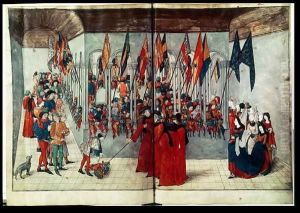Duke of Anjou & King of Naples Rene or Renatus I Paintings
René of Anjou, also known as René I of Naples and René I of Anjou, was born on January 16, 1409, in Angers, France. He was a member of the Valois-Anjou dynasty, a branch of the French royal family. René's life was marked by his claims to various thrones, including those of Naples, Jerusalem, and Sicily, earning him the nickname 'the Good King René'. Despite his royal titles, René's reigns were often fraught with conflict, and he spent much of his life attempting to secure and defend his claims.
René inherited the Duchy of Lorraine in 1431 through his marriage to Isabella, the heir of Duke Charles II of Lorraine. However, his claim was contested, leading to a series of conflicts known as the Lorraine Wars, which ended in 1441 with René's control over the duchy. His claim to the Kingdom of Naples came from his wife's rights to the throne, but his rule there (1435-1442) was challenged by Alfonso V of Aragon. Despite initially capturing Naples, René was eventually defeated and lost the kingdom, although he continued to use the title of King of Naples for the rest of his life.
Beyond his political and military endeavors, René of Anjou is remembered for his patronage of the arts and his own artistic pursuits. He was a supporter of the early Renaissance, commissioning works from artists and contributing to the cultural flourishing of his time. René was also an accomplished painter and book collector, and his court was a center of arts and learning. His patronage helped to spread Renaissance ideas and art throughout France and into the territories he ruled.
René's legacy is also tied to the Order of the Crescent, which he founded in 1448 to promote Christian chivalry. After his reign, René spent his later years focusing on the arts and his estates. He died on July 10, 1480, in Aix-en-Provence, leaving behind a legacy as a cultured and benevolent ruler despite the political and military struggles of his reigns. René of Anjou's life and work had lasting impacts on the culture of the Renaissance in France and beyond.
